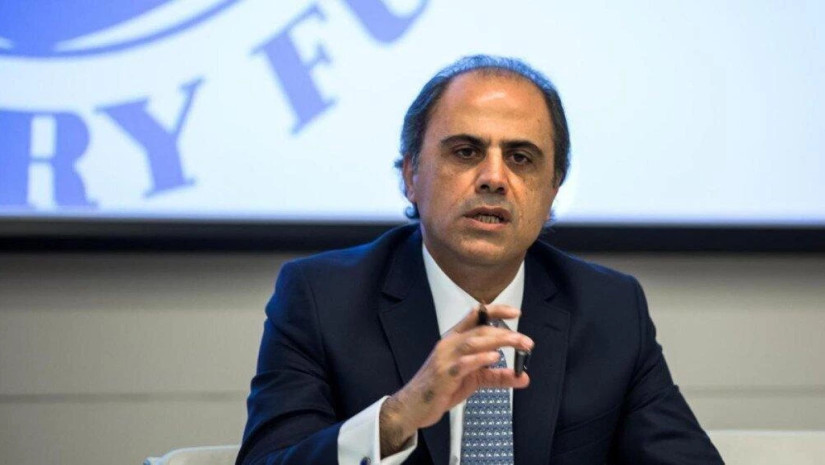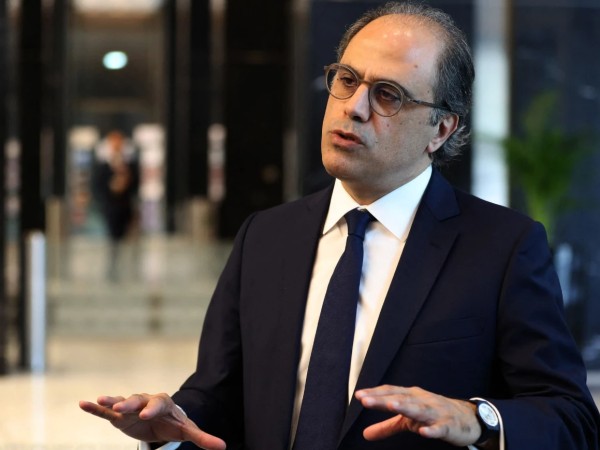Jihad Azour, Director of the Middle East and Central Asia Department at the International Monetary Fund visited Georgia in early July to get the onsite idea of how the economy is doing in Georgia and what are some macroeconomic challenges and opportunities facing the country. Mr. Azour had intensive meetings with all stakeholders, including government, National Bank of Georgia, private sector, business media and students.
I was also able to meet Jihad Azour in person during his visit in Georgia, as the representative of business media.
Our loyal readers, viewers and followers remember a number of - I would say - very interesting interviews with the Director of the Middle East and Central Asia Department at the International Monetary Fund. All these interviews were via ZOOM and it was a pleasure to see my respondent face-to-face.
The meeting behind closed doors lasted for almost an hour and we touched almost all the important topics that are on Georgia’s and to say frankly on the global agenda as well - including, inflation, monetary policy, economic growth and such topics that might have an impact on Georgia’s business community as well.
The reform agenda of the IMF is largely directed to set up a level competitive field for public and private sectors.
One reform in this direction is SoE reform. It is seen as an element that will bring additional productivity to the economy and help the recovery.
And another topic is basically getting rid of unnecessary tax exemptions through evaluating their impact and for generating more revenues for the budget in the face of high uncertainty that Georgia and the rest of the world are still facing due to several complex and tough successive shocks.
In this direction, the IMF Resident Representative for Georgia Selim Cakir provided more details. According to Selim Cakir, the IMF’s Stand By Agreement with Georgia has fiscal targets: Per Georgia’s fiscal rule today deficit has to come below 3% of GDP by 2023 and then the objective of the government and the IMF is to draw deficit closer to 2% of GDP to have some fiscal room in the light of the high uncertainty.
Selim Cakir explained that to get there could be some spending cuts - some of the COVID-related expenditure this year won’t be repeated - so there are some savings and fiscal is performing well according to the IMF - but going forward according to the same assessment could be some cuts needed.
Another way to have this fiscal room is to raise some more revenues but again here Georgia’s fiscal rule does not allow raising taxes so the IMF is looking for some other ways for Georgia to do that - one is to further improve tax administration practices and the other is to review tax exemptions.
The IMF is providing technical assistance in that direction to the Georgian government and looking into issues where there can be savings. Selim Cakir also mentioned that this year’s revenue performance has been much better than what the IMF envisaged - so there could be a case that substantial measures are not needed to meet the revenue targets and deficit targets. Whether this is the case or not will be more clear this fall when the IMF engages in 2023 budget talks with the Government.
Jihad Azour focused on two dimensions of the issue: Fiscal dimension and equity dimension. Fiscal dimension is related to the fiscal rule. Equity dimension is related to the need for the tax system to treat everyone equally. There are certain exemptions that might be needed for a certain period of time but in the long run the tax system must be neutral. According to Jihad Azour, you don’t want to have a tax system that promotes one sector in favor of others.
Here is a brief interview that I managed to conduct after the closed meeting ended.
Mr. Azour, welcome to Tbilisi. What were your impressions after talking to all the stakeholders – you managed to talk to almost all of them. What are main highlights?
It was an opportunity for me to come back to Tbilisi after two years because of COVID, and it was an opportunity to discuss with the authorities, the Central Bank the private sector and the students about the economic situation here and also to go over the program we have recently signed with Georgia with three important pillars – to preserve macroeconomic priority; to accelerate Georgia’s economic transformation and also, how to widen the social protection. It was an occasion to see how the economy is withering various shocks – COVID-19 shock, the war in Ukraine as well as also the big transformation we see globally with inflation and changes that we see in global trade.
You mentioned the stand-by agreement with Georgia – when shall the program start and what will be its main objectives?
The program has been approved by the board – therefore, it has already started. It’s a precautionary line which means that it’s only used when the country needs it. It’s a clear indication that this program is supporting the reforms that Georgia and the Georgian government is implementing. The purpose is to allow the economy to recover faster from those various shocks to maintain its stability, fight inflation, improve business environment and also strengthen social protection framework and allow also Georgia to accelerate the long term transformation of the economy where technology, climate related sectors will be driving the recovery.
Yes, but the stand-by agreement also includes some technical assistance to Georgia and also some of the reform agenda. What do you think is the top priority to make sustainable the growth numbers that we have right now?
Well, first of all, the cooperation between Georgia and the Fund is very deep – we provide the set of various type of technical assistance to the Ministry of Finance, to the Central Bank as well as to other agencies. The objective of those technical assistance is to help accelerate reforms: One is to strengthen the stability by reducing inflation and helping the Central Bank reduce dollarization; other set of reforms is to increase productivity and reform the State Owned Enterprises (SOEs); three is to improve the overall investment climate and attract the additional capital flows to Georgia – all these elements will help accelerate the recovery, keep the growth high, maintain the stability and also allow Georgia to improve its competitiveness internationally as well as in the region.
My last question and thank you for your time: What are the growth projections from the IMF ? Currently there are number of projections that vary from each other essentially – what is the Fund’s take on Georgia’s economic growth in 2022?
Well, as you know at the beginning of the year we were all projecting very strong recovery after 2021 that was also a very good year in terms of recovery after Covid. The war in Ukraine made all of us I would say aware of the but I think the nature of the recovery we see, the strength of this recovery may lead to revision upwards of the growth projections for 2022.















